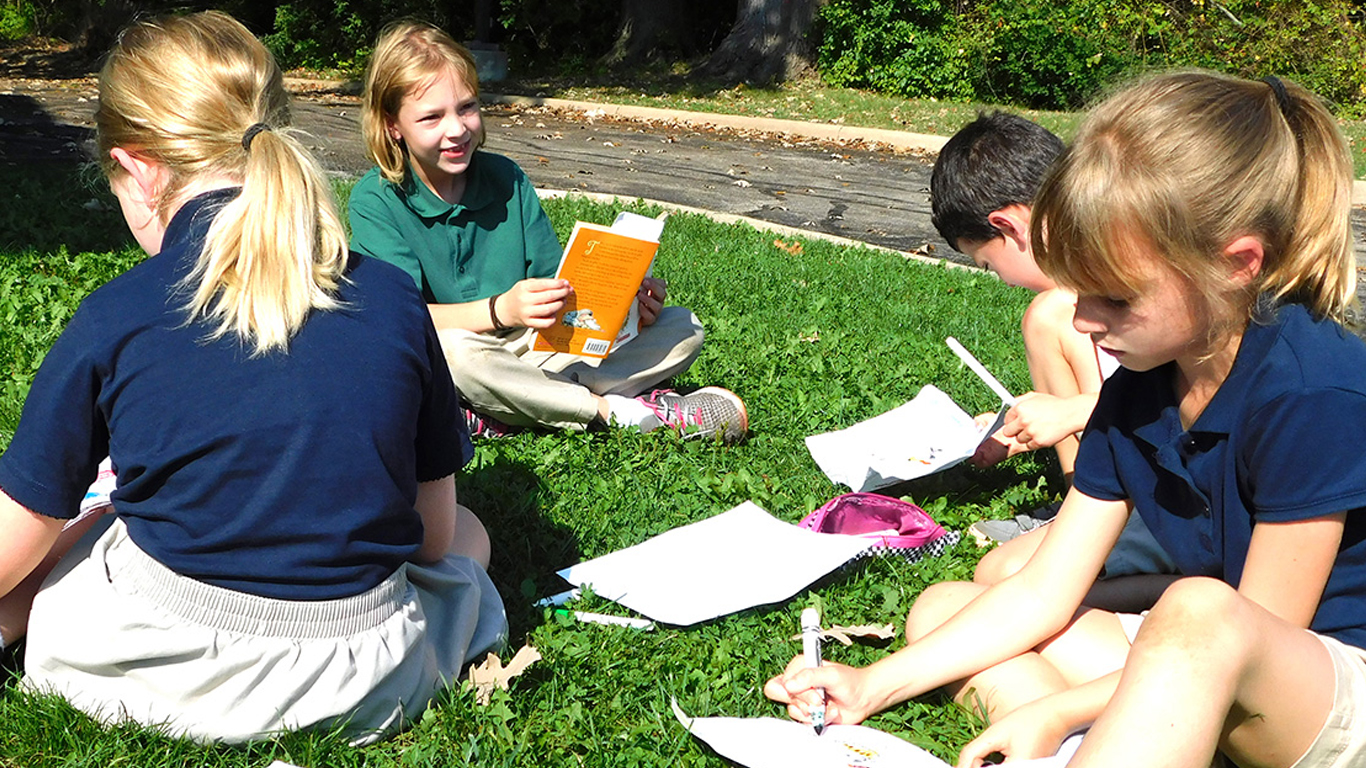From Upper School Principal Caleb Sasser’s commencement address to the class of 2024.
It is with great joy that I address you on this, the capstone day of your academic career thus far. You stand at the pinnacle of one achievement looking at the rest of your life ahead of you.
As you enter life as adults, I feel certain that you will be charged to “bring the light of Christ.” Specifically, though, what does it mean to bring the light of Christ?
In this time, I could point out that you are particularly equipped to go to those who Christ called “the least of these.”
I could point out that your reading and practice here has particularly prepared you to proclaim the gospel.
I could point out that your preparation here has particularly suited you to enter a world where immorality is cherished and redeem that world.
I want, however, to spend this time showing how you are particularly well-prepared to address three specific challenges facing our society—challenges that I think get to the very heart of bringing the light and life of Christ to the world in which we live.
First: Fractured Communities. Our communities are fractured and broken. The people within them are distanced from one another. The people in our communities have neither the close knit community of the monastery or the guild, nor the civic duty and sense of camaraderie of the earlier decades of our own country. Neighbors not only fail to speak to one another, they don’t even know one another. We live in a society which not only fails to love its neighbors, but doesn’t know its neighbors down the street, and even has a hard time envisioning a world in which true community exists.
You have been given the vision of what a redeemed community looks like. You have seen the way a community operates as you have been members of the WCA community. You have read and meditated on things like Flannery O’Connor’s Good Country People, Wendell Berry’s A Vision and St. Paul’s epistle to the Corinthians that cast this vision for you. This will require you to take steps that will make you feel uncomfortable, because people who seek to build genuine community in our society are frequently socially uncomfortable. The way to go about this is also to do the uncomfortable things: meet your neighbors; talk to, cry with, build up, and listen to your friends; host meals and eat with others (even in a dorm room); and build community in a thousand other small ways.
You are all equipped to do this: I see that equipping in the tutoring you have done as you participated in our community by helping younger students. I have seen it in your desire to encourage and build up one another, younger students, and your teachers. I have seen it in your leadership of your houses and your desire to give back to this place that has given to you. Do not let this preparation go to waste: do the hard work of building community wherever you find yourself.
Second: A World Without Imagination, Wonder, or the Capacity to Appreciate Beauty. Our society’s conception of the world has neither the color of Chaucer nor the mystery of Lewis. People in our society do not love beauty. Folks around us don’t care about it because they haven’t seen enough of it. Their environments are filled with ugly, practical things. They have been made to live in cities and buildings which are designed not for beauty, but for efficiency, with much of the same mindset as that used to design particularly inhumane dairy farms. The language they speak has none of the imagery of Shakespeare nor the tripping lightness of Frost. To people who speak a purely utilitarian language, the beauty of Christ as the Word makes no sense whatsoever. If people do not know what beauty is, they will not desire it. If they do not desire beauty, they will not create or contemplate it. Without beauty, the people truly perish. As the great trinitarian pastor and theologian Gregory of Nyssa once said, “Sin is the receding of the soul from the beautiful.”
Yet you have the ability to see the world as miraculous, to see the world as George Herbert did:
“The world is charged with the grandeur of God.
It will flame out, like shining from shook foil.”
You also have the ability to create this beauty all around you. You have practiced this with Mrs. Halleland and Mrs. Ziegler. You have studied from those who are greatest at this: Homer, Michelangelo, Milton, Bach, and Monet. I see you creating and loving this beauty in your writing, in your music, in your art, and in your words. Continue to do so. The creation of beauty is not a hobby or a secondary task, it is vitally important to make us fully human.
Third: Metaphysically Misled. Those around us do not know who they are or what their place is in the kingdom of God. They question even the nature of reality, but are too intellectually indolent to ponder what the true implications of that may be. This is not to disparage anyone, but to point out that as a society, intellectual indolence is valued. People in our society are not only metaphysically misled, but dangerously, metaphysically lazy.
The great Irish Poet William Butler Yeats said it this way:
“Turning and turning in the widening gyre
The falcon cannot hear the falconer;
Things fall apart; the centre cannot hold;
Mere anarchy is loosed upon the world,
The blood-dimmed tide is loosed, and everywhere
The ceremony of innocence is drowned;
The best lack all conviction, while the worst
Are full of passionate intensity.”
The philosophical basis for understanding and interacting with reality has been taken away by men like Derrida and Beckett. Aquinas, Augustine, and Plato have been left behind. We must call people back to a world where truth is valued and where inquiry and the quest for truth is both acknowledged as hard and yet daily attempted.
You have been prepared to address this dangerous lack of truth in the world around you. You have read and considered the deepest thinkers of the Western World. You have written so much that your writing is precise, efficient, and logical—an excellent vehicle to communicate and seek after truth. You have sought for truth in class debates, in Socratic discussions, in essays, and in presentations. Keep seeking for truth, and keep inspiring others to do it as well.
A warning before I wrap up: You have well-sharpened intellects. You have been given all of the necessary tuning, sharpening, and oiling. You have been prepared in all the right ways. Sharp tools, however, can be used for the wrong ends. It does not matter how much you sharpen the ax; if you use it to cut a hole in the boat, you will still drown. Use what you have been given in the right way and for the right purposes.
Now, [graduates], it is for you that I give you this last charge which is especially dear to my heart: keep your eyes fixed upon Jesus. Bind the name of Jesus on your hands and keep it as a frontlet before your eyes. Love Jesus, and out of that love, love others.
As you rest in Christ, may you build community, fill the world with beauty, and seek truth.







